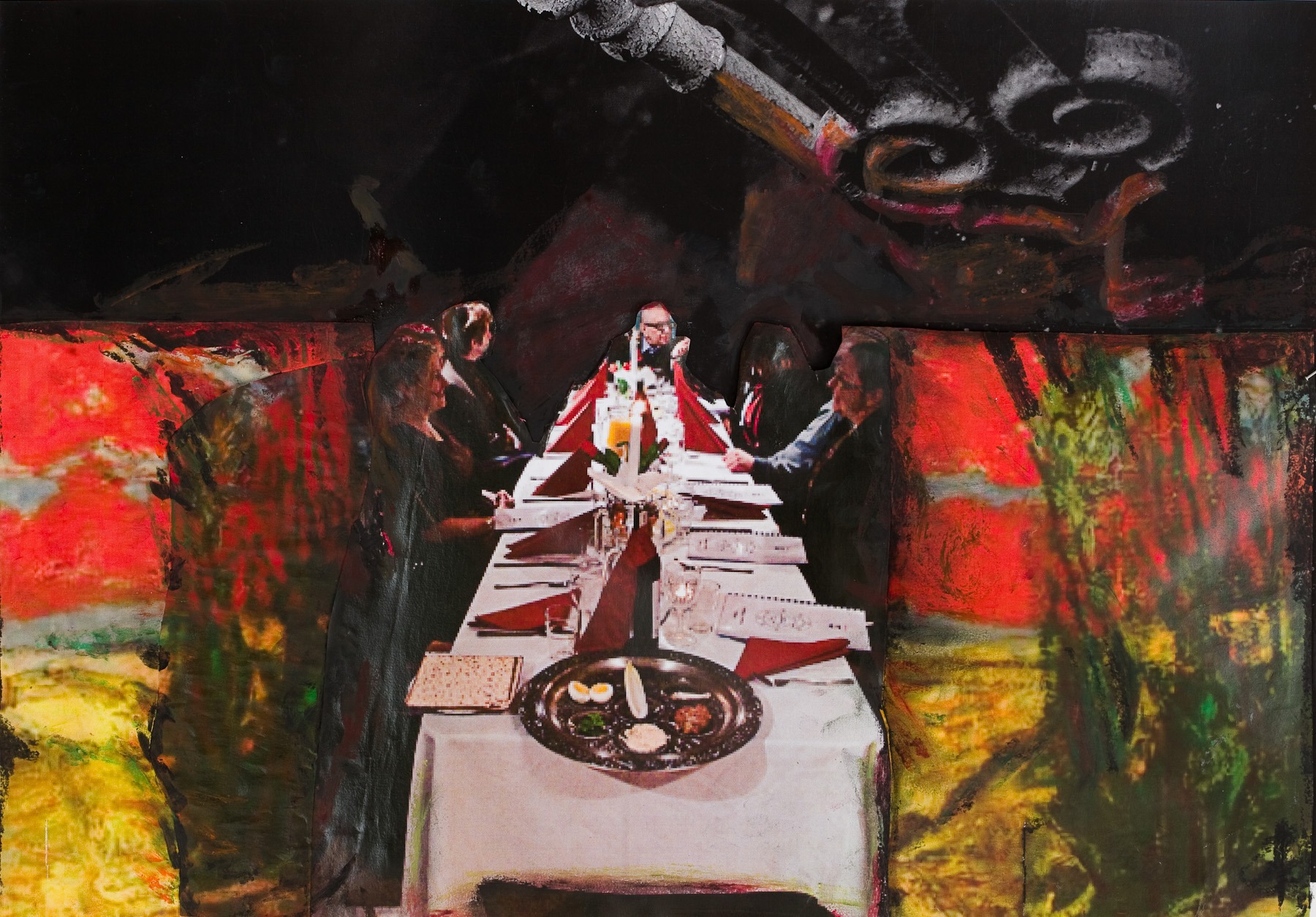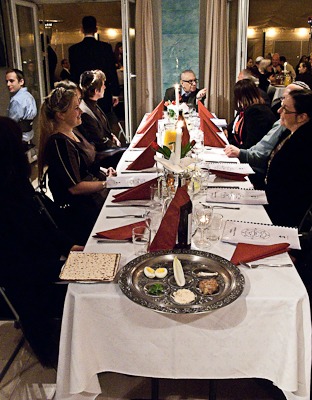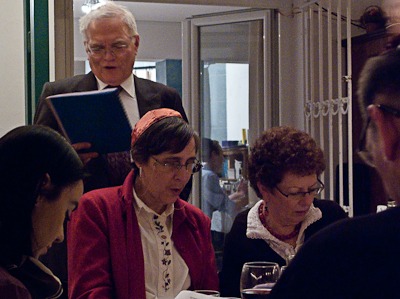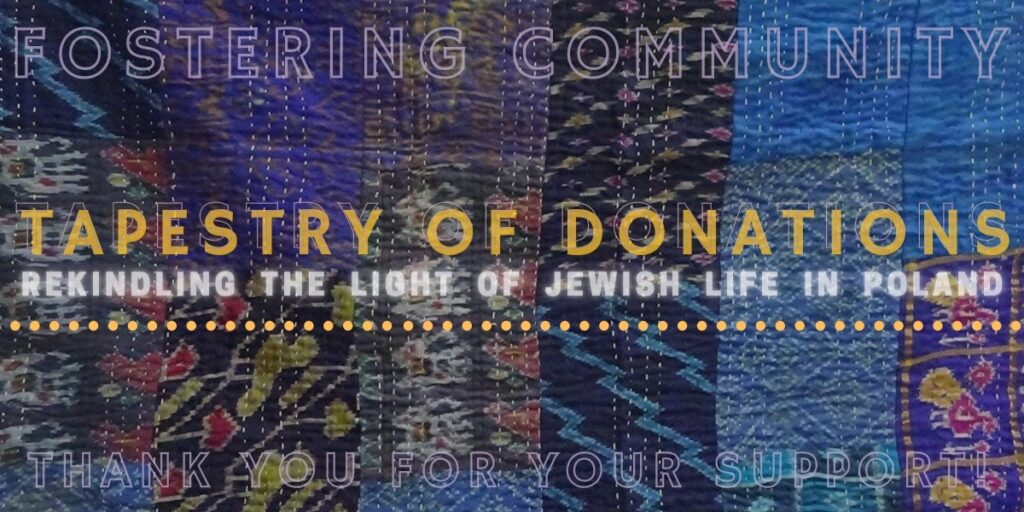Dr. Joanna Auron-Gorska is the leader of Beit Bialystok, the newest community of Poland’s Progressive Jewish communities known as Beit Polska. In this essay she reflects on the Seder she attended at the flagship congregation Beit Warszawa this March. Dr. Auron-Groska’s poetic evocation of the spirit of Jewish renewal in Poland reflects a recent event that would have been deemed unimaginable twenty years ago. Jewish Renewal in Poland (www.JewishRenewalinPoland.org) is an effort of the World Union of Progressive Judaism, the European Union of Progressive Judaism, and Friends of Jewish Renewal to support Jewish congregational life. We are not a memorial project but a living community seeking to encourage Jewish life. You are invited to learn more and support this exciting positive development. We’ve added a glossary of terms.
Leaving Mitzráyim
Joanna Auron-Górska
The first night of Pesach this year at the Beit Warszawa synagogue I found out about leaving Mitzráyim.[1] I was talking to a few prospective Gerrim.[2] “My parents have always told me that during the war most of our family had moved to Belzec”, one of them said. Moved to Belzec? During the war, moved to a town where there was a Nazi killing center? But he had never given it a thought, he says – until 10 years ago, when, in Auschwitz, during the March of the Living, he heard, from the loudspeaker, a list of place names: “Auschwitz, Majdanek, Treblinka… Belzec”. Belzec. At that moment he knew – without ever knowing. He started coming to services in our Warsaw synagogue and studying towards conversion. But when he announced to his parents the news of his Brit mila,[3] they called him mad – and yet they handed to him… his grandmother’s marriage certificate. Written out and signed by the town rabbi. He showed me the document. It is beautiful.
At the age of 44, he found out that he is, by birth, a Jew. Amazing that he should have made that connection all by himself, guided to it by the voice speaking over the barracks of the Auschwitz camp. Equally amazing that his family should have kept the document that could have got them in trouble.
There were five of them in the synagogue at the Seder. Each of them had their Brit mila just the previous week, March 17, 2013. Five men in their late thirties or early forties who wanted so much to be gathered into Klal Israel[4] that they had chosen to renounce the security of living in uncircumcised flesh. Five men – the largest brit mila ceremony to have been performed in Poland since World War II.
On the first day of Pesach we read from the Haftorah[5] from the book of Joshua: the Jews have now crossed the Jordan. The parallels announce themselves to us in our own Polish Jewish history. World War II was Polish Jewry’s Mitzráyim; now we have emerged from that and the Soviet domination that followed until 1989-1991. The older generation all died in the desert and, yes, our grandparents too have, nearly all, by now died. Joshua must now circumcise all the men over forty from among his people. It’s been 70 years now since we wandered the desert: our fathers and grandfathers had no way of being Jews, and neither did we. No knives with which to ease our baby boys into the covenant, no manna from God, and no assurance of a land that flows with milk and honey. Cut off from Jewishness by an accident of history and fate, the post-war generation could not teach us what it means to be Jews: that is why we must learn our heritage and customs from books and from those good Jews who come to Poland to teach us.
As we sat in the services together, as we read through the Hagaddah[3] together and shared the Pesach meal, I remembered the men and women who for two generations could only afford to break the bread of lies: each Pesach[7] the bitter taste of broken commandments and negating the self, for the salt water graves that sit among crosses, and (grand)children’s baptisms for their bitter herbs. Things we have done we would we had not done. But at the crowded noisy feast of this Warsaw Seder, there was happiness, seated, reading and singing and eating, around that Pesach table. And I pondered upon Mitzráyim and the years in the desert, and I felt gratitude and joy but I also felt heart-melting awe: indeed, Aleinu leshabeach L’Adon HaKol[8] for the unfathomable and all-forgiving love he shows the lowliest among His children. But thanks are due also those Jews who hold our hand as they lead us out of the desert. Without you, who were not exiled from among your people – so that now you can instruct us in how to live as Jews – we would not know how to walk back into who we are.
Maybe, a Pesach seder[9] like all others. We read the Hagaddah, we sing a song: but there are five more voices who join us in singing and in prayer. Sharing the table with the five men, probably still in pain that they would not admit, I rejoiced at the power of our God who helps us and guides us in His wisdom back to where we belong. In Poland – the accursed “there” land that the modern Pharaohs, one from the East and one from the West, have fashioned out of what had been the land of the Haskala[10] and Hassidism[11] – to whisper in our ears the blessing on seeing 600,000 Jews? That many returning from exile? It is God’s work indeed that in Poland, the land where rolling fields of wheat can speak of murder, our voices proclaim: Ani echad yodea .[12]
On the day before Pesach, one of the five men told me: “Just after the surgery, I fainted. I guess it must have been prophet Elijah who took my hand and invited me for a walk.” Prophet Elijah, Rabbi Nativ, the whole Jewish people. Just as surely as Moshe had led Jews out of Egypt through the desert and Joshua led them into Eretz Israel,[13] our Israeli rabbi helped our Jewish men walk back into the covenant that God had made with us through our genetic and spiritual ancestors. Men and women at those Warsaw Seder tables, women and men at other Seder tables – we are all instruments in HaShem’s[14] perfect miracle of Pesach.
[1] Mitzrayim is the Hebrew term for the country of Egypt. The rabbis took the name Mitzrayim to mean more than the geographic reference to the region where the Nile River narrows. Rather, “the narrows” refers to the sense of constricted consciousness that keeps people in a spiritual slavery. Dr. Auron-Gorska’s reflection invites us to experience Mochin D’gadlut, (Aramaic, expanded consciousness) in “Leaving Mitzrayim.”
[2] People studying to become Jewish are Gerrim, proselytes.
[3] Brit Milah is the ritual marking the covenant sealed in the flesh of males. Normally, the ritual of circumcision takes place at the age of eight days old. It is a far more complex procedure later in life.
[4] Klal Yisrael is the term that refers to the collective embodiment of the Jewish people.
[5] Haftorah – prophetic reading
[6] Hagaddah – the “telling” or the “narrative”
[7] Pesach is Hebrew for the Holiday of Passover. But the rabbis read this as two Hebrew words – the “conversation”
[8] Aleinu leshabeach L’Adon HaKol “We must praise the God of All” is a reference to a key prayer now in the daily prayer book that originated in the High Holiday prayerbook.
[9] Pesach seder Hebrew for the Passover meal and orderly re-telling (Hagaddah) of the going out from Mitzrayim.
[10] Haskalah is a literary and social movement among Polish Jews influenced by ideas of openness to general cultural, science, and political reform.
[11] Hassidisism is a Jewish pietistic revival of Jewish life roughly contemporary with Haskalah also originating in the Polish lands.
[12] Ani echad yodea is an emblematic song from the Seder signifying the progression of Jewish consciousness based on the commitment to the One God.
[13] Eretz Israelis the traditional term for the mystical idea of Israel, the place of a restored Jewish life.
[14] HaShem means “the Name” and is a reference to God.
Here is a letter I sent to my rabbinic colleagues just before the events reflected upon in Dr. Auron-Gorska’s letter from the Passover Seder.






Leave a Reply